Rise and Shine: The puppet-filled "Waking Up!" at EMU is an all-ages feast for the eyes
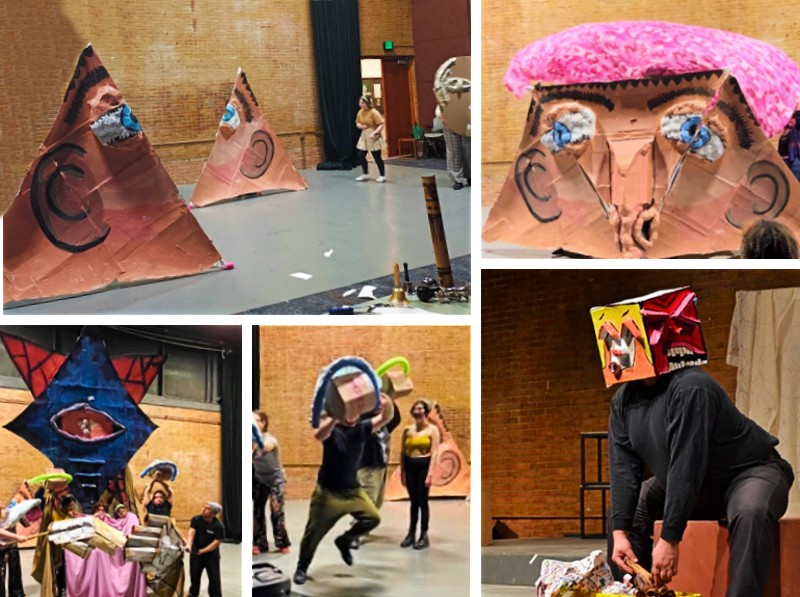
Color, music, and PUPPETS, oh my!
Waking Up! at Eastern Michigan University's Sponberg Theatre is a family-friendly devised show full of wonder, audience interaction, and play. It is perfect for audiences 8 and up and encourages booing, cheering, clapping, and laughing.
Senior MFA student Cameron Prevatte created and directed this piece of devised theatre—a collaborative production where an ensemble comes together to create something from scratch, without the aid of a set script. There usually aren’t traditional design elements either. For Waking Up!, nine students make up the ensemble: Jujuan Adams, William Clapp, Sebastian Dahlgren, Wesley Foster, Sarah Kucharek, Cameron Prevatte, Annabelle Rickert, Cassie Paige, and Ember Seth.
Prevatte comes from a background in puppetry and the show is filled with them. Some are huge, some are tiny, but all are interactive and play major roles in the stories.
The One-Woman Show “All Things Equal: The Life & Trials of Ruth Bader Ginsburg” Tries to Humanize the Late Supreme Justice

At a 2021 family funeral, one of my aunts, whom I hadn’t seen in decades, immediately guessed which car in the lot was mine: “I saw something with Ruth Bader Ginsburg on it hanging from the rearview, and I said, ‘Dollars to doughnuts, that’s Jennifer’s car.’” (Guilty!)
So, when I arrived at the Michigan Theater on March 14 to see the touring one-woman show All Things Equal: The Life & Trials of Ruth Bader Ginsburg by Rupert Holmes, the deck was already stacked.
But let’s be honest: I was hardly the only fan at the show’s packed Ann Arbor performance. As a feminist icon who arguably did more than anyone to advance women’s legal rights in the 20th century, RBG long ago achieved progressive, secular sainthood.
This ultimately poses a challenge for Holmes and his show, which stars Michelle Azar and is directed by Laley Lippard. How do you bring such a lofty figure down to earth and make her human?
Because frankly, despite Holmes structuring the play as an intimate talk between RBG and a couple of her granddaughter’s young friends in the justice’s chambers, it’s hard to not feel as if we’re prostrating ourselves at the altar of this powerhouse legal mind’s legacy.
Three Years Later "The Fourth Messenger" Gets Midwest Premiere at The Ark on March 18
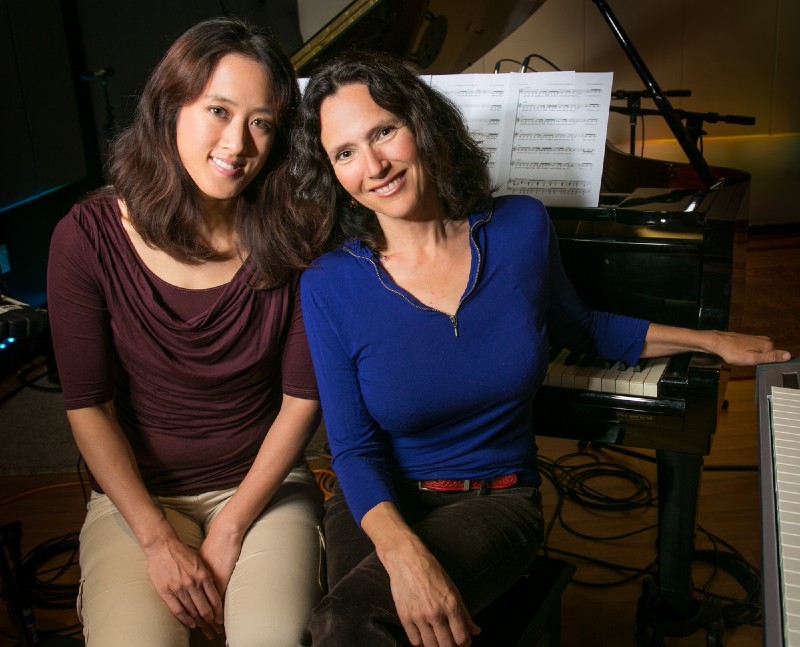
Three years ago, The Ark was set to be the venue for the Midwest premiere of The Fourth Messenger, a musical with a modern perspective on the life and teachings of the Buddha. Then the pandemic hit and the musical was canceled.
Now, almost three years to the day, The Fourth Messenger, with book and lyrics by Tanya Shaffer and music and additional lyrics by Vienna Teng, will finally get its Midwest premiere at The Ark on March 18. The concert-style performance will be a benefit for The Ark, Ann Arbor’s popular home for folk, jazz, and alt-country.
In an interview with Shaffer in 2020, she described what inspired the musical while she was on a spiritual retreat.
“The idea came to me on a nine-day silent retreat when I was supposed to be clearing my mind,” she said. “I was thinking about the story of Buddha’s enlightenment, where he was found under a tree and vowed not to get up until he found enlightenment. Then for many days and nights, all the temptations of the world are trying to get him up. And it came to me that it would be cool as a song and dance, the temptations standing under a tree and then thinking the whole story would be a musical because it has that scale of a hero’s quest, and so I got excited on the retreat and for many hours forgot about my breath and I thought about the musical.”
Shaffer didn’t pursue the idea for another five years. She said she had trouble deciding how to handle the story about the historical Buddha and his teachings.
“I started to think how would people view this story if it was a woman, and I wanted to update it and make it feel very relevant and contemporary,” Shaffer said. “So it took me five years to find my way into it and then many years to workshop.”
The Fourth Messenger premiered at the Ashby Stage in Berkeley, California, in 2013 and was presented at the New York Musical Festival in 2017.
Encore Theatre’s "Once on This Island" combines lilting songs, dynamic dancing, and caustic social commentary

Deep bass drums beat out a rhythm inviting people to dance. They dance to keep alive their spirits and their culture. They dance with joy, but life is never easy, even on a Caribbean island—especially when the island is Hispaniola and the country is Haiti.
Haiti is a troubled land. It has been hit hard by earthquakes, hurricanes, and a long history of unstable governments.
But the people of Haiti are resilient and fight back time and again. They also are in a divided country. There is a racial divide between the wealthy mixed-race elites and the struggling peasant class.
Once on This Island is based on Rosa Guy’s novel My Love, My Love. Lynn Ahrens’ book and lyrics for the musical Once on This Island combine a love story with a caustic take on class in the Caribbean. Stephen Flaherty composed the music that combines Caribbean beats for lively dances and soaring pop music for plaintive songs of yearning.
The Encore Musical Theatre presents an energetic, even passionate, production of the Ahrens-Flaherty musical through March 12 at the Maas Performance Center in Dexter.
An Honest Mistake: Purple Rose Theatre’s “Human Error” Uses Comedy and Relationships to Bridge the Nation’s Growing Political Divide

It’s no secret, this is a divided country. The chasm has widened between liberal and conservative, rural and urban, and religious and not so much. We don’t talk to each other; we scream at each other.
Playwright Eric Pfeffinger takes this disturbing truth and imagines what would happen if right meets left under unusual circumstances in Human Error, a comedy having its Michigan debut at the Purple Rose Theatre Company in Chelsea.
Madelyn and Keenan, described as NPR-listening, latte-sipping blue staters, have gone to a fertility clinic in hopes of starting a family. Unfortunately, as a nervous doctor tells them, their fertilized embryo has been implanted in another woman’s uterus.
Heather and Jim, described as small-government, churchgoing, card-carrying NRA members, agree to meet with Madelyn and Keenan, and after discovering they don’t have horns, Heather agrees to give the liberal couple the baby when it’s born.
Director Lynch R. Travis and his uniformly excellent cast do a good job of balancing Pfeffinger’s mix of broad comedy and heartfelt connections. The set is simple and spare. White chairs become a car, storage bins, and love seats. The stage backdrop is a set of curved gray-white walls for easy entries and exits. The audience is not distracted by scenery from the point the playwright hopes to make.
U-M students go back to the Victorian era in Oscar Wilde’s “The Importance of Being Earnest"

It was still early in rehearsals and cast members were beginning to master an unfamiliar language as well as a different set of values in a distant time. It was the ’90s when a queen reigned and defined an age.
No, not the 1990s, the 1890s.
That’s when Oscar Wilde’s The Importance of Being Earnest made its debut.
The University of Michigan School of Music, Theatre & Dance will present Wilde’s giddy and ever-popular comedy February 16-19 at the Arthur Miller Theatre.
Every year musical theater majors at the University of Michigan perform in a non-musical production. It’s all part of making theater students at ease in both musical and non-musical productions and honing their skills.
Production director Vincent Cardinal, a professor of musical theater at the University of Michigan, has directed and produced scores of productions across the country and is also a noted playwright. Cardinal said Wilde makes it easier for the actors to get into the Victorian era.
“You’re never in better hands than someone like Oscar Wilde,” Cardinal said. “Wilde is going to give them great language, really great characters, and they’ll be really good. When not solving problems, they’re becoming really good at their craft.”
Jen Silverman’s absurdist dark comedy "Bonnets (how ladies of good breeding are induced to murder)" is a feisty feminist fable
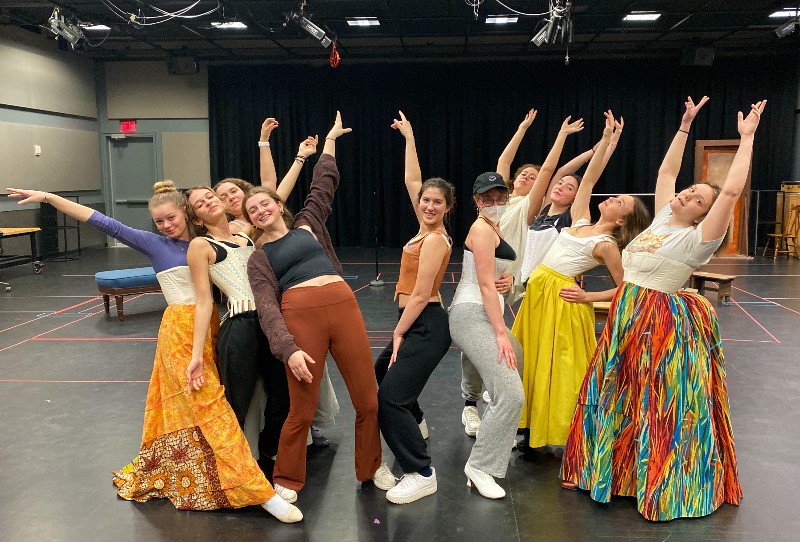
Jen Silverman’s Bonnets (how ladies of good breeding are induced to murder) is so violent that it took a fight director and two assistants to choreograph it. Death by poison arrow, chainsaw, Ninja—it’s all there for your delight and horror. Even God, a character in the play who opens every scene, is powerless to stop it.
The chorus of one song in Bonnets goes like this:
Chop, chop, chop, chop, chop, chop
We killed a man a-piece and we just couldn't stop!
Glug, glug, glug, glug, munch, munch,
Join me for tea-time, you might not live to lunch.
Will anyone survive in the dark comedy that runs February 16-19 at Lydia Mendelssohn Theatre?
Pricilla Lindsay, who directs University of Michigan theater students, says the play shifts between three eras. “Silverman picked three of the many times men have subjugated women—Salem in 1690, England in the 1890s, and France in the 1600’s, during the reign of Louis XIV. All three periods are not special but indicative of women being moved to the side. In our play, women wreak havoc and get revenge by actually murdering.”
These women don’t stop at killing their abusers.
“A young girl who is having an affair with a married man accuses his wife of being a witch,” Lindsay says. After his wife hangs, the man decides to leave for Boston—without his young paramour. ”You’re dead to me,” she declares.
In this play, that can only mean one thing.
Ann Arbor Musical Theater Works Brings The Cult Musical “Moby Dick” to the Children’s Creative Center

What’s weirder than learning that there’s a stage musical adaptation of Herman Melville’s Moby Dick?
Learning there are two, actually, one from 1990 and another from 2019.
And the Moby Dick adaptation that came first, which includes a book by Robert Longden along with music and lyrics by Longden and Hereward Kaye, is the one that local theater artist Ron Baumanis has been jonesing to stage via his company, Ann Arbor Musical Theater Works.
“Whenever I see a show, whether it’s on Broadway or the West End, I always leave thinking, ‘Would I want to do it or not,’” said Baumanis, whose Moby Dick production begins its two-week run February 9 at The Children’s Creative Center.
“When I saw this in the West End, by intermission, I thought, ‘I’ve absolutely got to do this show someday.’ … I was drawn to the weird mix of the show’s all-out hilarious comedy with British pantomime and a lot of burlesque elements.”
Carnal Letters: UMS's No Safety Net series closed with two Rachel Mars plays that explore the expression of desire
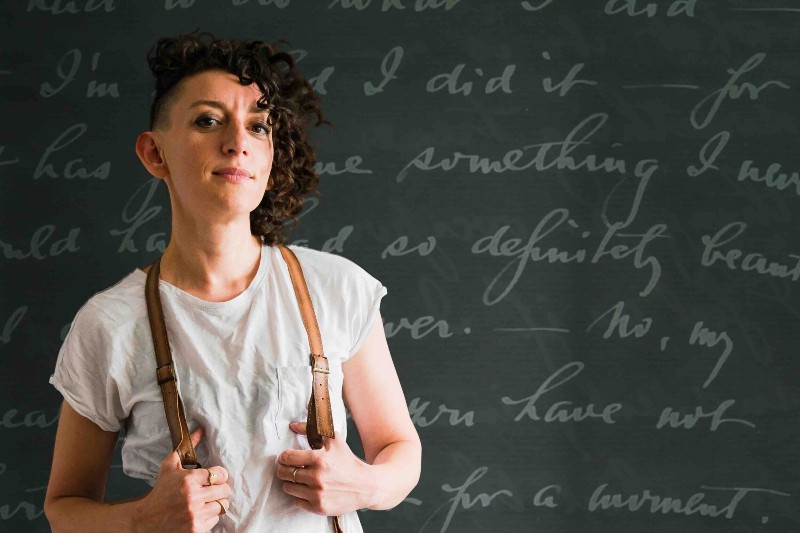
If there’s one common thematic thread between British theater artist Rachel Mars’ two shows, Our Carnal Hearts and Your Sexts Are Shit: Older Better Letters, it’s desire and the ways in which it’s expressed.
Both shows wrapped up UMS’s No Safety Net event series with Our Carnal Hearts quickly assuming the feel of a darkly comedic, secular church service complete with a small choir on a bare stage. It takes envy as its focus and explores how our ego reflexively ties itself in knots when a peer or loved one succeeds.
Mars even has the audience say, in unison, “Congratulations! I’m so happy for you!” in the same fake-enthusiastic tone we’ve all employed at one time or another in the interest of appearing like an adult instead of a petulant child.
Presented in the round, Our Carnal Hearts features a different singer—Rhiannon Armstrong, Rebecca Atkinson-Lord, Kelly Burke, and Louise Mothersole—seated in the middle front row of each side. It also combines cheeky musical asides composed and arranged by Mothersole, short audience interactions, and storytelling to plumb the question: why does another’s triumph inevitably make us feel small or less than?
Searching for the Right Words: Julia Cho's award-winning "The Language Archive" makes its Michigan debut at Theatre Nova
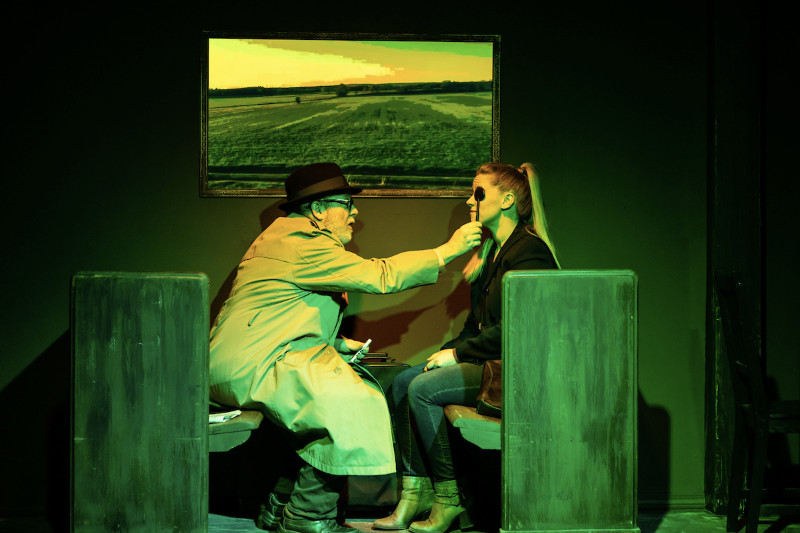
When Julia Cho read about dying languages, she wondered if losing a language meant something larger—losing a whole way of looking at the world.
In her whimsical play The Language Archive, Cho explores the questions: Do languages that develop between people in a country (or a marriage) die when the participants die? Does the culture die when the language does?
First produced in 2009 at The South Coast Repertory Theater in Costa Mesa, California, and then in 2010 at the Roundabout Theatre Company in New York City, The Language Archive makes its Michigan debut at Ann Arbor's Theatre Nova, February 3-26, directed by Carla Milarch. (The play won the 2010 Susan Smith Blackburn Prize, awarded to a new English-language play by a woman.)
“There are sixty-nine hundred languages in the world. More than half are expected to die within the next century,” says George, a linguist and the play’s protagonist. In addition to his native English, George speaks eight languages including Greek, Cantonese, Esperanto, and Elloway—the last of which is a dying fictional tongue.


































